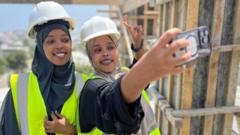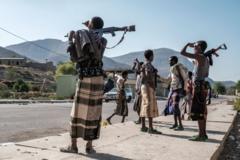In a groundbreaking move for Ethiopian media, the dating show Latey: Looking for Love brings a fresh twist to the traditional narrative of romance, showcasing the journey of ten women competing for the affection of a single man, Messiah Hailemeskel. The 38-year-old Ethiopian-American, who resides in Dallas, fulfills the role commonly seen in popular shows like The Bachelor. The unique production has gained significant attention, amassing over 620,000 views since its finale, but has also stirred discussions regarding the implications of such an open portrayal of dating in a conservative society.
The series allows women from varied backgrounds—including managers, flight attendants, and accountants—to share their experiences, creating a tapestry of personal struggles against the backdrop of a competitive dating environment. Contestants engage in various challenges, from boxing matches to creative tasks like producing a mattress advertisement, fostering camaraderie among them while navigating emotional truths. Bethel Getahun, the winner of the series, emphasizes the importance of representing women's realities and breaking taboos surrounding their voices in Ethiopian media.
Critics, however, have voiced concerns over the show's Westernized premise and its potential to reduce women to mere participants in a competition for affection. Ethiopian vlogger Semere Kassaye argues that dating has traditionally been a private and dignified matter. Some viewers echoed these sentiments, questioning the cultural appropriateness of such a format, stating that it risks objectifying women and trivializing Ethiopian values.
Despite these critiques, producer Metasebia Yoseph insists that Latey respects cultural boundaries, framing its premise within a more innocent understanding of dating. She proposes that the show encourages viewers to rethink and discuss cultural norms, reinforcing the narrative that Ethiopian culture is not monolithic, but diverse and evolving.
The show's success seems to resonate with a segment of the audience yearning for more progressive depictions of love and relationships. Positive feedback ranges from admiration for the show's risk-taking to excitement for potential new formats, such as a female lead choosing from male suitors in a future season.
As for Bethel and Messiah's relationship post-show, their connection has become strained due to the long-distance nature of their circumstances. Nonetheless, Bethel has built a supportive network with her fellow contestants, whom she affectionately calls her "sorority." She is hopeful that Latey will pave the way for further representations of women in Ethiopian media, advocating for a narrative where women's voices and stories are given space and respect.
Through Latey, the intersection of reality television and Ethiopian culture opens a platform for dialogue on modern love, dating, and gender equality, reshaping collective perceptions and conversations around these critical issues.
The series allows women from varied backgrounds—including managers, flight attendants, and accountants—to share their experiences, creating a tapestry of personal struggles against the backdrop of a competitive dating environment. Contestants engage in various challenges, from boxing matches to creative tasks like producing a mattress advertisement, fostering camaraderie among them while navigating emotional truths. Bethel Getahun, the winner of the series, emphasizes the importance of representing women's realities and breaking taboos surrounding their voices in Ethiopian media.
Critics, however, have voiced concerns over the show's Westernized premise and its potential to reduce women to mere participants in a competition for affection. Ethiopian vlogger Semere Kassaye argues that dating has traditionally been a private and dignified matter. Some viewers echoed these sentiments, questioning the cultural appropriateness of such a format, stating that it risks objectifying women and trivializing Ethiopian values.
Despite these critiques, producer Metasebia Yoseph insists that Latey respects cultural boundaries, framing its premise within a more innocent understanding of dating. She proposes that the show encourages viewers to rethink and discuss cultural norms, reinforcing the narrative that Ethiopian culture is not monolithic, but diverse and evolving.
The show's success seems to resonate with a segment of the audience yearning for more progressive depictions of love and relationships. Positive feedback ranges from admiration for the show's risk-taking to excitement for potential new formats, such as a female lead choosing from male suitors in a future season.
As for Bethel and Messiah's relationship post-show, their connection has become strained due to the long-distance nature of their circumstances. Nonetheless, Bethel has built a supportive network with her fellow contestants, whom she affectionately calls her "sorority." She is hopeful that Latey will pave the way for further representations of women in Ethiopian media, advocating for a narrative where women's voices and stories are given space and respect.
Through Latey, the intersection of reality television and Ethiopian culture opens a platform for dialogue on modern love, dating, and gender equality, reshaping collective perceptions and conversations around these critical issues.





















